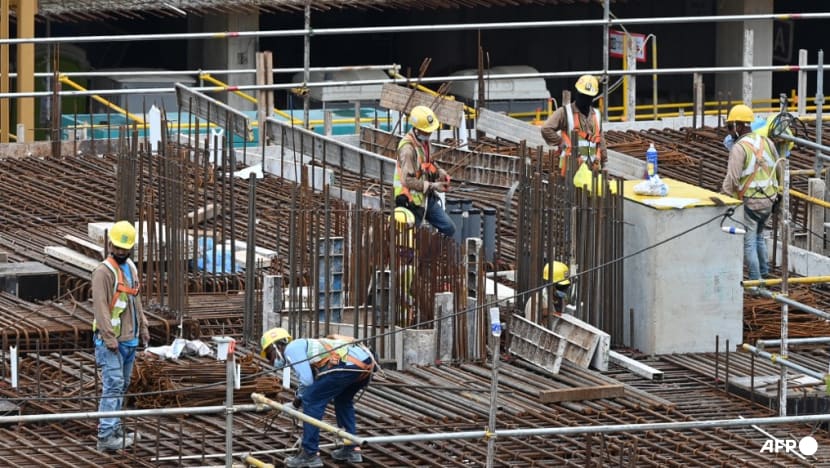New community-led fund launched to provide financial help to migrant workers with critical illnesses
The fund aims to raise S$410,000 next year to support at least 20 migrant workers over two years.

Workers at a construction site in Singapore on Sep 14, 2021. (File photo: AFP/Roslan Rahman)

This audio is generated by an AI tool.
SINGAPORE: Ms Bhing Navato had been working in Singapore as a migrant domestic worker for close to three decades when cervical cancer struck.
“I knew for sure I wouldn’t have a job anymore, and I didn’t have savings because everything was sent to my family,” said Ms Navato during a launch event for a new community-led fund for migrant workers on Friday (Dec 6).
“My biggest challenge was how would I go through the treatment without anything.”
Fortunately for her, a group of friends in Singapore started a public fundraising campaign to help with her chemotherapy costs.
“(It was) such a big help. If not for them, maybe I’m in a worse situation,” she said.
“We don’t have so much money. If we fall ill, the only thing we can do is go home and think about it.”
Among those who were involved in efforts for Ms Navato were Mr Vincent Ng and Ms Anthea Ong.
Born from their experiences of helping individuals such as Ms Navato, the pair have co-founded a fund that aims to provide "immediate financial relief" to migrant workers who are diagnosed with critical illnesses and cannot afford life-saving medical treatment.
Called the CritiCare Fund for Migrant Workers, the community-led initiative seeks to help workers pay for critical illness treatments that are not covered by their mandatory insurance.
The goal is to ensure that all low-wage migrant workers, "regardless of media attention or personal connections", can get "life-saving support", added the fund's secretariat in a press release.
Ms Ong is a former nominated member of parliament and a social entrepreneur, while Mr Ng is the founding member of a local cooperative.
SHAPED BY EXPERIENCES
Donations to the fund will be collected and administered through Singapore-based charity Ray of Hope, and will be overseen by a "community-led council comprising healthcare professionals, civil society leaders and employment agents".
Each worker’s case will be evaluated by the secretariat, which will conduct "verification and needs assessments to determine suitability" before providing a recommendation for the council’s final decision.
“Despite giving their best years to our country, their mandatory insurance does not cover outpatient treatments like chemotherapy or overseas care if they are repatriated,” said Ms Ong.
“While organisations like MWC (Migrant Workers' Centre) and NTUC do provide lump-sum payouts which can cover critical illnesses, these amounts often fall short of the actual costs required for treatment.”
Plans are underway to involve representatives from government agencies and employers in the initiative to ensure that "diverse perspectives" are represented in its administration, said the secretariat.
Next year, the fund aims to raise S$410,000 (US$306,000) through a "whole-of-society effort".
The target is to raise from S$100,000 from public donations, S$250,000 from foundations and charities as well as S$60,000 from corporate partnerships to support at least 20 migrant workers over two years.
Looking beyond providing immediate relief, the fund is also aiming to "catalyse long-term change" by collecting data to "advocate for more inclusive insurance coverage and systemic reforms", said the secretariat.
Said Mr Ng: “Kind-hearted employers and civil society crowdfunding efforts have done incredible work but they cannot address the issue alone. This fund is a step toward systemic reform while providing immediate relief.”















